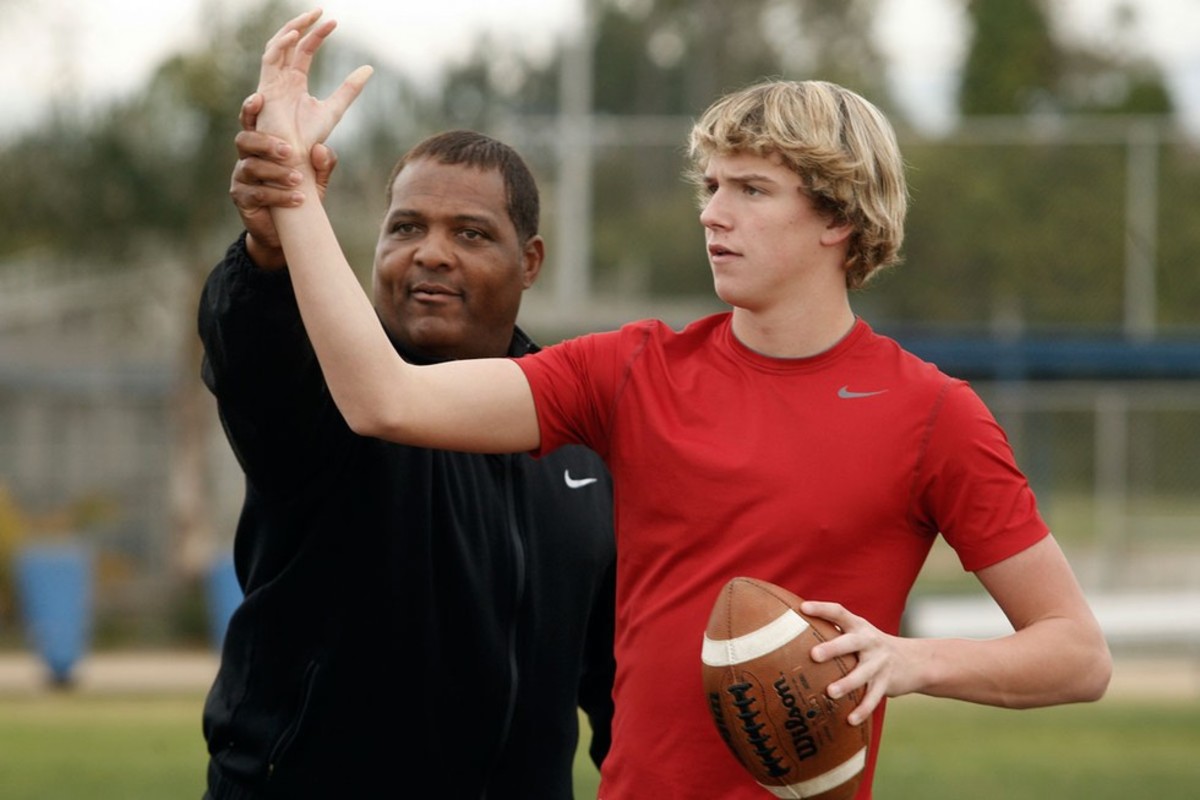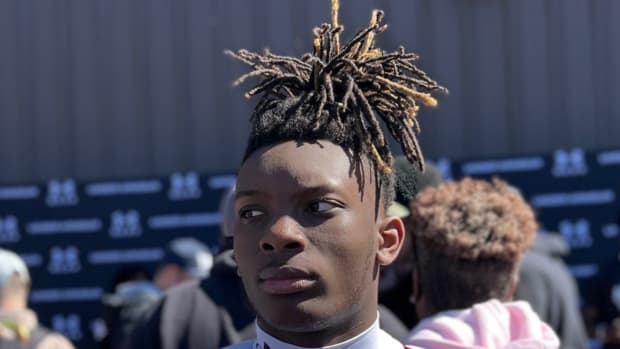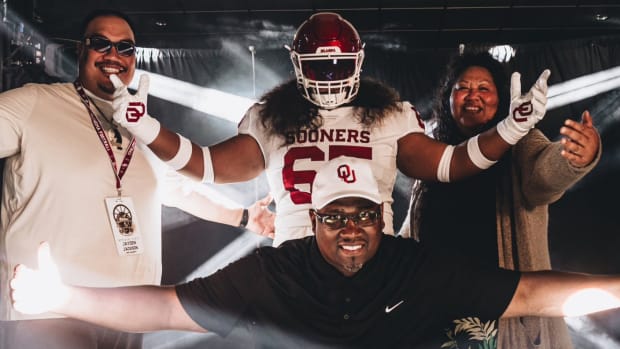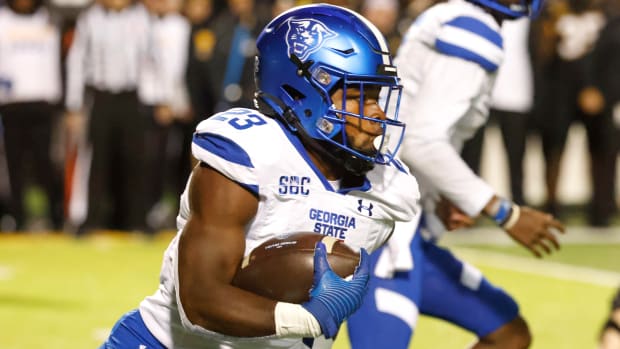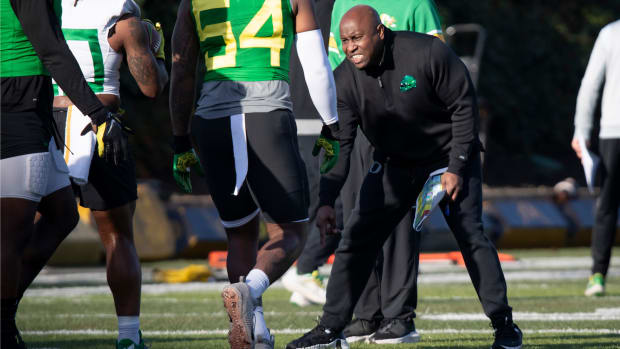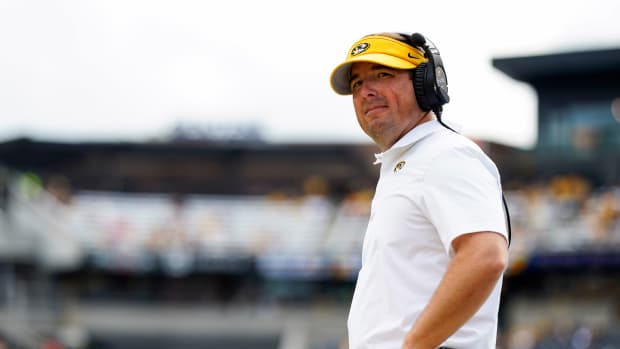Gurus or Frauds? With proliferation of private QB coaches comes important question: how much does it actually help?
[video: 13724883]
This is Part VI of an eight-part series on the recruiting, development and evolution of quarterbacks. The next installment will be Thursday with a first-person essay from former Oklahoma and current Texas A&M quarterback Trevor Knight.
The way Emerson Fromm saw it, there was only one way for his son Jake to get the attention and recognition he needed.
In the summer of 2013, Jake Fromm was an undersized rising high school freshman, an aspiring college quarterback with no scholarship offers attending a skills camp in Cochran, Ga., when he caught the eye of George Bobo. A longtime, well-respected high school coach in the Atlanta area, Bobo is considered by some to be the first quarterback guru in the south. He also happens to be the father of Mike Bobo, who was Georgia's offensive coordinator at the time and has long been considered one of the bright young minds in college football.
Days after George Bobo pulled Jake aside for some one-on-one tutoring, word filtered back to Jake that Georgia wanted him on campus as soon as possible. And Emerson had an epiphany.
"None of these coordinators are gonna talk to somebody's daddy," said Emerson in a thick Alabama drawl. "But if (a private coach) calls, there's credibility there. George Bobo, he put Jake on the map."
Soon, Jake Fromm started working with renowned private trainer David Morris, who runs the Mobile, Ala.-based QB Country, an organization that specializes in year-round training, and who has worked with the likes of AJ McCarron, Cardale Jones and Matt Barkley.
As Jake's skill set (and frame, 6' 2", 203 pounds ) grew under the instruction of Morris, Jake became one of the top quarterback prospects in the country with his arm strength and ability to thread the ball into tight windows. He verbally committed, but flipped his commitment to Georgia on March 3 after Kirby Smart—the Crimson Tide's longtime defensive coordinator and Fromm's primary recruiter at Alabama—returned to his alma mater and took the Bulldogs head coaching job.
The Fromms liked Morris because he "doesn't solicit guys—you have to seek him out." Even if the cost can be steep (most coaches charge a minimum of $100/hour for one-on-one work and sometimes much more), the Fromms felt Morris offered more than just his teaching ability.
"Obviously you want to get better, that's important," says Emerson Fromm, who estimates that each trip from Warner Robins, Ga. to Mobile, Ala., to work with Morris costs their family 12 hours and $1,400 when factoring in payment for food, lodging, gas and instruction.
"But what you're really trying to do is create a relationship so he's willing to stick his neck out for you."
Once considered a niche side gig reserved for the rare elite prospect, private quarterback coaches have exploded in popularity. As specialization has grown throughout youth athletics, so too has the demand for private coaches. Of the 12 top-tier 2017 quarterbacks in Elite 11, the premier quarterback training event occurring this week on Nike's campus in Beaverton, Ore., at least seven of them work with private coaches. (Four did not respond to inquiries.) Campus Rush reached out to each of the 65 Power 5 schools to ask how many of the players in contention for the starting quarterback job in 2016 work with private coaches. Forty-four schools responded with hard data: More than a third of work with private coaches (33 of 90), typically in the off-season.
But it's not just the set starters or Division-I hopefuls; plenty of backups work with private coaches, too. It is, undeniably, a booming business. But is it a necessary one?
JOHNSON: Why do prep quarterbacks commit so early?
Steve Clarkson was the first of his kind. A Los Angeles-based coach, Clarkson pioneered the private quarterback coaching space, taking on his first client, Perry Klein, some 30 years ago. Klein went on to play for the Atlanta Falcons, while Clarkson was featured in The New York Times and profiled on 60 Minutes. Clarkson has worked with dozens of signal-callers since then, from Super Bowl winner Ben Roethlisberger to former UCLA standout Brett Hundley to class of 2017 superstar Tate Martell. On his website, Clarkson is referred to as "The Dreammaker."
Three decades ago, he was one of a few private coaches. Now a weekend visit to any football field around Southern California reveals hordes of kids flocking to so-called "gurus," with players ranging in talent from legitimate FBS prospects to junior varsity backups. Clarkson, 54, attributes the shift to a few factors.
"The thing that's changed is that you're recruiting kids at a much younger age," Clarkson says. "And because of that, gone are the three-sport stars. For better or worse, kids specialize. There are a lot more recruiting services now, too … Kids are racing to get the four- and five-star recognition."
Another big change: In the past few decades, as high schools have slashed their budgets, coaches are taking on more roles, thus diminishing the already limited time they have to work in the spring and summer with their own players. "It's like, now the football coach is also the tennis coach and is also the assistant athletic director," Clarkson says. "Who has time? Kids were left to fend for themselves."
Everyone, it seems, has a private coach, and if they don't have one—or can't afford one—they want one.
Clarkson cornered the market first, but the most well-known quarterback coach is, undoubtedly, San Diego-based George Whitfield. A regular on ESPN's College GameDay, Whitfield became a part of the college football lexicon in 2013, when he worked extensively with Heisman Trophy winner Johnny Manziel. Fox Sports reporter Bruce Feldman chronicled their journey in his 2014 book, The QB. Whitfield blew up just like Manziel; a December 2013 article on Bleacher Report explained, "How George Whitfield became Johnny Manziel's Mr. Miyagi."
Aaron M. Sprecher/AP
Whitfield owns, operates, and functions as the "QB engineer" at Whitfield Athletix, where he and his staff "strive to create a complete and dynamic quarterback," according to the website. Given the popularity of quarterback coaches in 2016, the Whitfield Athletix mission statement brings a dose of irony: "The quarterback position is the most difficult position to play in sports," it says. "Unfortunately it also the most undercoached (sic) position in sports."
"When a parent comes to me and has me work with their kid, the only thing I tell them—and notice I didn't say 'promise'—is that their son will be better, and I will do my absolute best in exhausting myself and my staff trying to make him better," Whitfield says. "But there are absolutely people who prey on kids in this industry."
Especially the young ones. Whitfield is continually perplexed by repeated emails from parents of very young children that "tell us how dedicated their son is, that he's putting in all these hours and for his fifth or sixth birthday, he wants private training. Well, for us, that's too young. I never set out to be the world's coolest babysitter."
In some parts of the country, though, it's considered normal.
Robert Hall started at quarterback for three years at Texas Tech under legendary coach Spike Dykes and was inducted into the Red Raiders Hall of Fame in 2008. Now 45, Hall has spent most of adulthood working as a high school offensive coordinator and, in recent years, as a private coach. He has a proven track record, too: Hall coached former TCU All-America Trevone Boykin, now with the Seattle Seahawks, since Boykin was a sophomore at West Mesquite (Texas) High, where Hall was an assistant. Fresno State quarterback Chason Virgil was a student of Hall's as is Chris Robison, an Oklahoma commit participating this week in the Elite 11.
Now the offensive coordinator at Horn High in Mesquite, Texas—Hall followed head coach Mike Overton from West Mesquite—he is able to work with his guys while rotating in other kids who are sometimes from other schools, sometimes younger, or both. And as for how young is too young, well, remember the state.
"This is Texas," Hall says. "I've seen quarterbacks move to four different high schools in four years. I'm talking about parents selling $300,000–$400,000 homes and changing jobs just so their kid can be the starter. We're not playing for the fun of it. This is a business."
Hall had a "light day" on Father's Day this year, training just four kids—a one-hour session each, at $100 a pop—but will often work out seven or eight kids each weekend day. Like Morris of Alabama-based QB Country, Hall doesn't solicit clients. He doesn't need to.
"I've got guys around here, fathers, who want their second-graders to get training," Hall says. "I mean, second-graders can't really process information yet. They're just rolling on the ground, happy to be alive."
The insistence of some parents to professionally train an elementary school child prompts the question: Can a second grader even throw a football? Hall laughs.
"Well, no, not really," he says. "But their parents are adamant. And you know, sometimes the parents know best. Most the time the kids would rather just play video games. In Texas, parents have a plan. And that plan is, 'Just wait until my kid is old enough and gets his turn.'"
SCHNELL: Five stars, two transfers: The winding tale of Jake Heaps
There's plenty of speculation about just how much a quarterback coach actually helps an elite prospect.
Acknowledging that private coaches are more common now, Whitfield said he's not convinced quarterbacks need extensive (and often expensive) one-on-one work to rise above their peers. And if they do, it doesn't necessarily need to happen in childhood. He points out that some of his most famous and "biggest" students were "already national names before they got to me. Look at Cam Newton. He already had a miniature museum at his home in Atlanta when we met. He was a national champion, a Heisman winner, the SEC Player of the Year."
Clearly, there are benefits. As Jake Fromm and his family say, relationships help facilitate more relationships.
Whitfield estimates that of the 65 power schools, he probably has a "personal relationship with a coach on staff at 80–85% of them." That bodes well for an unknown talent working with Whitfield.
Clarkson, who was part of one of the most bizarre and well-documented quarterback recruiting cases of the modern era, looks at it the same way.
The story goes that in 2010, Clarkson was working with, and subsequently blown away by, 11-year-old David Sills. Two years later, still enamored but craving an objective take, Clarkson sent then-USC head coach Lane Kiffin some video of Sills. Kiffin drooled over an adolescent with Sills's skill set and build and offered him a scholarship. At 13, Sills committed to the Trojans. The story took off nationally, with many wondering if the NCAA was letting recruiting get out of control.
Mason Levinson/Bloomberg via Getty Images
Sills wound up decommitting from USC and instead enrolled at West Virginia, where he moved to wide receiver. He announced last month that he will transfer from the Mountaineers to El Camino College in Torrance, Calif., a junior college, to pursue his dreams of becoming a quarterback.
"In terms of connections, the only thing that someone in my shoes can do, because of our reps, is we can call a coach, and they'll at least look at a kid on film, based on a recommendation" Clarkson says. "But if you're a private coach, you can't say, 'This is the best kid ever.' Because if you give five college coaches a list of five top quarterbacks and ask them to rank them, you'll get five different lists."
Every private coach, parent and player spoken to for this story says they would never trust a coach who promises a scholarship—but they know they're out there.
A few years ago, Whitfield did an analytical study of his own students and found that over a two-year period, 26 of 28 students had received partial or full college scholarships to play football. For a while, he displayed the results in his office. "But then I thought to myself, 'That's dangerous, because when people come in, we're not looking for a blue chip,'" he says. "Everyone walks through the same set of doors. We just want to help kids."
Others, he says, want to help only themselves and their reputations.
Whitfield says he knows of one private coach—he won't give names, or location details—who was "selling a spot. This coach worked at some of the highest, most-esteemed quarterback competitions, and he charged families $40,000 for the dream, or the promise, of 'making the cut' at that highly esteemed camp."
SCHNELL: How the Elite 11 helped Trent Dilfer overcome tragedy
Some college coaches chafe at the idea of private coaches. My athletes, they reason, should be coached by my staff and me. In a 2014 USA Today story that detailed private coaches' growing influence on current college quarterbacks, Florida State coach Jimbo Fisher said: "We've got good quarterback coaches. My guys aren't going out there. I'll coach them. When they go to pro ball, they can do whatever they want." Stanford told Campus Rush that the Cardinal do not allow their quarterbacks to train privately.
Most private coaches get it and say they only work with kids with whom they have long-standing relationships. Often, those private coaches were involved in the players' recruitment, so it comes as no surprise to the college coach when the quarterback wants to continue working with his private coach throughout his career.
Still, college coaches can be leery of an outsider changing their quarterback's mechanics, or of getting in his ear too much. A couple seasons ago, when a handful of Whitfield's pupils opted to change schools, many wondered if Whitfield encouraged them to do so. Some jilted fans accused him of being a street agent.
"I've come to be at peace with those accusations," Whitifield says. "You know, in some cases, you become part of these kids' families. And if a youngster is going through a process and he says he wants you to be a part of it, you step up.
"When some of our QBs did transfer or at least talked very loudly about it, I understood [people] were going to zero in on the constant: me. But if you walk a straight line, you won't have a problem."
Clarkson says he never tries to steer a kid one direction or another. But given the shifting landscape of college football, where the first question to a newly named backup is do you plan to stick around or transfer?
Clarkson doles out this advice: "If they're going to make you go to school early, graduate as fast as you can and get your degree, because that gives you freedom [to transfer]. Worry about your football career when you have two years [of eligibility] left—because that's how the game is played now."
JOHNSON: Are spread offenses harming the futures of college quarterbacks?
Hall, the former Texas Tech quarterback recognizes the role—and accompanying criticism—that comes with being a private coach. But he also empathizes with kids who don't want to feel left behind. If everyone on your team is working with a private coach except you, "you and your parents are starting to worry you're gonna get moved to corner."
Hunter Johnson, a class of 2017 quarterback who will be at Elite 11 this week, has worked with a private coach in his hometown of Brownsburg, Ind., for three years. He's benefitted from a tightening of mechanics and classroom study of the game yet admits that the genesis of hiring a coach might have been good, old-fashioned peer pressure. "I do think there's an expectation," Johnson says, "maybe even pressure, if you want to be an elite guy, to get a private coach."
Clearly, it worked for Johnson. On Dec. 14, just two weeks before Clemson competed in College Football Playoff, Johnson committed to the Tigers.
And the good news for Johnson, or anyone else who finds themselves in need of an individual coach: In the time it took to read this, someone new has probably set up their website, touting all the reasons why they can help young quarterbacks achieve gridiron glory. Remember, there are no rules or regulations when it comes to private coaches, and there's never a shortage of gurus—which, of course, is part of the problem.
"People think their kids are the golden children, and they can take them to the promised land," Hall says. "They believe in this private coaching, so they're going after it."
And at $100 per hour, it's good work if you can get it.
